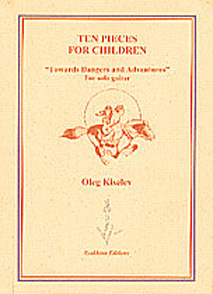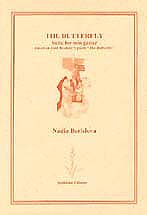


Uroš Dojcinovic | Jovan Jovicic | Dmitry Dovgopol | Oleg Kiselev
Carlos Padro | Nadia Borislova | Ulf G. Åhslund | Burt Griswold
Guitar Compositions from Yugoslavia
Manuel Y. Ferrer

Autumn (Suite IV for solo guitar)
$20
|
Autumn (Hösten in Swedish) is program music in six movements evoking the different appearances of a Swedish autumn. The first movement evokes a whirlwind; the second the calm before the storm; the third the storm; the fourth a promenade; the fifth snowflakes; the sixth glittering snow. This original 1970 edition from the defunct publishing house Reuter & Reuter is presented here as a gracious donation from the composer to Syukhtun Editions for the upkeep of this website. It is becoming a collector's item in Sweden, along with other original works published by him, transcriptions and a guitar school which was very popular for amateurs and teachers in the 1970s and 1980s. Mostly self-taught, Ulf G. Åhslund was born in northern Sweden in 1938 and is one of the pioneers of the classical guitar in his country. He is the featured guitarist in the autumn 2012 issue of the Swedish guitar magazine Gitarr och Luta. Ulf G. Åhslund created the pedagogical guitar departments at the Stockholm Music Institute and the Royal Academy of Music in Stockholm, and held regular classes on Swedish television with a quarter of a million students. (Similar televised guitar classes in England had one and a half million viewers.) His pedagogical books (which were best-sellers) and sheet music have been translated ínto several languages. This suite no. IV for classical guitar has become a much-loved classic for guitarists of all ages. Ulf passed away on July 23, 2013. |
listen to the complete suite as played by the composer:
Hösten

POETRY ON SIX STRINGS
110 pages
Music for the guitar by
young Mexican composers
based on contemporary Mexican poetry
(CD included) $25
edited and performed by Nadia Borislova
OUT OF PRINT
|
This album of sheet music with accompanying CD, and complete texts of the poems, is in collaboration with FONCA (Mexican National Foundation for Culture and the Arts), BUAP (the University of Puebla, Mexico) and Syukhtun Editions. The Project is under the leadership of guitarist and composer Nadia Borislova, who is also professor of the guitar at Puebla University. Nadia has recorded all the compositions of the eleven young Mexican composers and recites in Spanish each of the poems on which they are based. She writes in the prologue: "Really it was a privilege for me to play all these works. I leave you with Poetry and Music, where I also leave my part, because to be an interpreter it is necessary to love the works, and to play all this material I had to transform it into a part of my life. Every work, every poem coursed in my veins, my spirit and here I leave you with my presentation."
|

Little Russian Suite
(two guitars) $15
OUT OF PRINT
|
"The duo guitar version of Little Russian Suite is based on the solo composition with the same title, composed in 1968 by Yugoslav guitarist Jovan Jovicic (b.1926). Being one of Segovia's students at the Music Academy Chigiana in Siena (Italy) in the late sixties, Jovicic devoted his artistic life to promote the classical guitar in ex-Yugoslavia. He gave over 2,000 solo concerts, all over the native country as well as abroad. Jovicic composed dozens of interesting pieces based on various traditional themes. Among his best known pieces for sure is his suite on three Russian themes: The first is "Dance on the board," the second "Moscow evenings," a famous song-theme by V. Solovyev-Sedoy, and the third Russian traditional song is "Kalinka." Using the rich guitar-sound possibilities Jovicic's arrangement has the effect of a whole group of Russian traditional instruments, balalaikas and others. I myself performed this piece for many years, especially when I was touring in Russia, Belaruse, Ukraine... On several occasions I had the pleasure to perform in the wonderful city of Odessa (Ukraine), and collaborate with the exceptional female guitar duo: Elena Korochavina, professor of the guitar at the Music Conservatory in Odessa, and her former student Ludmila Kabour. Impressed by their artistry I was ready to fulfill their request and rearrange this suite for two guitars." (Uroš Dojcinovic)
|

listen to an excerpt:
Elena Korochavina and Ludmila Kabour playing

Carlos Padro
(In Memoriam)
Milongas and Preludes
(solo guitar) $15
OUT OF PRINT
|
The Argentinian guitarist /composer Carlos Padro passed away in 2003. This memorial album contains two milongas and four preludes, and exemplifies the merging of the European classical guitar tradition with that of Latin America, as well as that of Native America, as heard in Padro’s “Incan Prelude” in this volume. Contents: Atardecer, Pa’ Usté, Prelude No. 1, Prelude No. 2, Prelude No. 3, Incan Prelude. (Any further details about the life and work of Carlos Padro would be greatly appreciated. Please contact me at the email below.) A friendly email (31.X.06) from one of Carlos Padro’s former students, Carlos Stella from Buenos Aires, has added a little more information, and hopefully more will come, including a photograph or two. Mr. Stella writes: "I studied with Prof. Padró between 1975-1978. I do not have too much information but I remember that he had an album with a Vivaldi concerto which includes a 'Baguala' by Padró. I remember that he always had at hand a photo playing guitar with 'maestro' Segovia. I still have the guitar which he suggested me to buy and it still sounds very well (we bought it in Bs As Province in a place called San Andrés). In those days he had his first child (Juan Sebastián) who now must be nearly thirty. Until recently I did not know he died. His brother told me once when we meet on the subway." Here is a Padro LP cover and Spanish text contributed by Carlos Stella. |

Three Serbian Folk Dances
(guitar duo - concert version)
$15 plus shipping
OUT OF PRINT
|
The traditional Yugoslav folk dance called kolo is danced in a circle, which can be opened and closed or uncoiled like a chain. There are many different kinds of kolo dances. The tempo is usually fast, but can be varied from slow, medium, fast and very fast in the same piece. The number of dancers is not fixed, and there are a multitude of diverse movements, steps and figures, depending on the character of each dance. The dancers can move forward, backwards, left, right, or spin separately during the course of the dance. They are mostly accompanied by instrumental music, but sometimes even combined with vocals. Traditional kolo themes are usually by unknown composers. Most of the best-known pieces are from the second half of the 19th and first half of the 20th century. Pašona (pashona) is a word probably related to the Turkish word pasha, the ruler of an Ottoman province. Uzice is a city in the western part of Serbia. Pašona and Uzicko (uzhichco) kolo dances are among the best known old Serbian folk dances.
|

Two Serbian Folk Dances
(guitar duo - easy version)
$6 pdf file sent by email
"Bamboo's Songs"
OUT OF PRINT
Dmitry Dovgopol was born in 1961 in Russia, and now lives in Yekaterinburg. Dmitry graduated from Tumen Art College as a classical gutarist. In 1989 together with another Tumen graduate – Valentine Ostanin – he organized the “Soul's Delight” guitar duo. The duo's concert life is still very active. In 1994 and 1998 the guitarists recorded two CDs. Dmitry Dovgopol's compositions for guitar solo and ensembles are published in "The Ural Collection for Classical Guitar" and other issues; his music is played by the “Soul's Delight” duo, "The Ural Guitar Trio", and by several Russian solo-guitarists. "Bamboo's Songs" has a variety of special effects on the guitars including imitation of the side-drum, Jew's harp and percussion effects. (see video below) Print out: page no. 1 of score and Technical comments
Pashona Kolo
Uzhichko Kolo

(two guitars) $9


"Towards Dangers and Adventures"
Ten Pieces for Children
(solo guitar) $15
OUT OF PRINT
| |
Oleg Kiselev, Russian guitarist, composer and a teacher was born in
1964. He
is a graduate student from the Chelyabinsk Musical College, where he
studied
with the well known Russian guitarist, composer and teacher Victor
Kozlov.
Oleg Kiselev has performed solo recitals in many cities in Russia,
and has also participated in international festivals in Poland, Serbia, Hungary
and Russia. He
has composed 300 pieces for the guitar, and has recorded seven CDs. Oleg Kiselev composes music in several different styles including
jazz,
latino, modern, romantic, pop. The significant area in his creative
work is
music for children and youth. At the present time he teaches guitar
at
a school of arts in the town of Asha.
In addition to Syukhtun Editions in Sweden, his music is published in Poland, Russia, Italy, Belgium, Germany,
Switzerland
and the USA. Reviews of Kiselev's music were published in the magazines Seicorde (Italy), Classical Guitar (Great Britain), Guitart(USA), Guitar
Review (Russia) and Guitarist (Russia).
|

The Butterfly Suite
(seven pieces for solo guitar) $15
based on Nobel prize-winning poet Joseph Brodsky's poem cycle of the same name
(the entire English version is included in the album)
OUT OF PRINT
|
Nadia Borislova, composer and guitarist born in Moscow in 1969, started playing guitar at eight and completed her professional studies at the 48th Moscow School of Music and at the Gnesin State School of Moscow. From 1988 to 2003 she has played on several stages in Europe, Mexico, Cuba, and Costa Rica. Since 1988 she has composed different compositions for guitar and other instruments. The most known are: the suites “The Butterfly,” “Waltz-Scherzino”, “The Names of Snow,” “The Dance of the Wind and the Shaman” and “Mirage” for guitar and clarinet; “The Ocean Train,” concerto for guitar and piano, “March” for guitar and three clarinets, “On a Feminine Night”; “Sonnet” for two guitars,” “Mirage IV” for clarinet and guitar, and “The Flower Remembering a Rain”. She has been living in Puebla Mexico from 1992 and works at the music college of BUAP (School of Fine Arts at Puebla University). In the same year she founded the guitar ensemble where she is the director. In 1995 she recorded her first CD playing her own compositions, and in the same year she acquired Mexican nationality. She has recently returned from a concert tour in Cuba, where she received a standing ovation. Among those standing was Leo Brouwer. More about Nadia Borislova |

Burt Griswold Other compositions by Burt Griswold:
PawnKing

Sonatina
Song Bird Sing
Meditation IV
Kogi Song
Hymn for the New Era
Alright
Slow Swing










